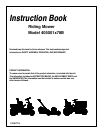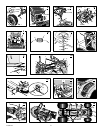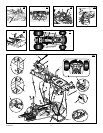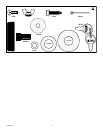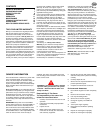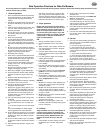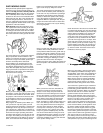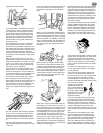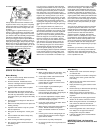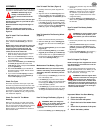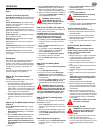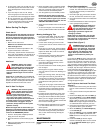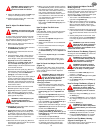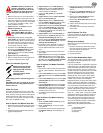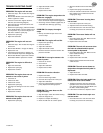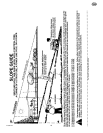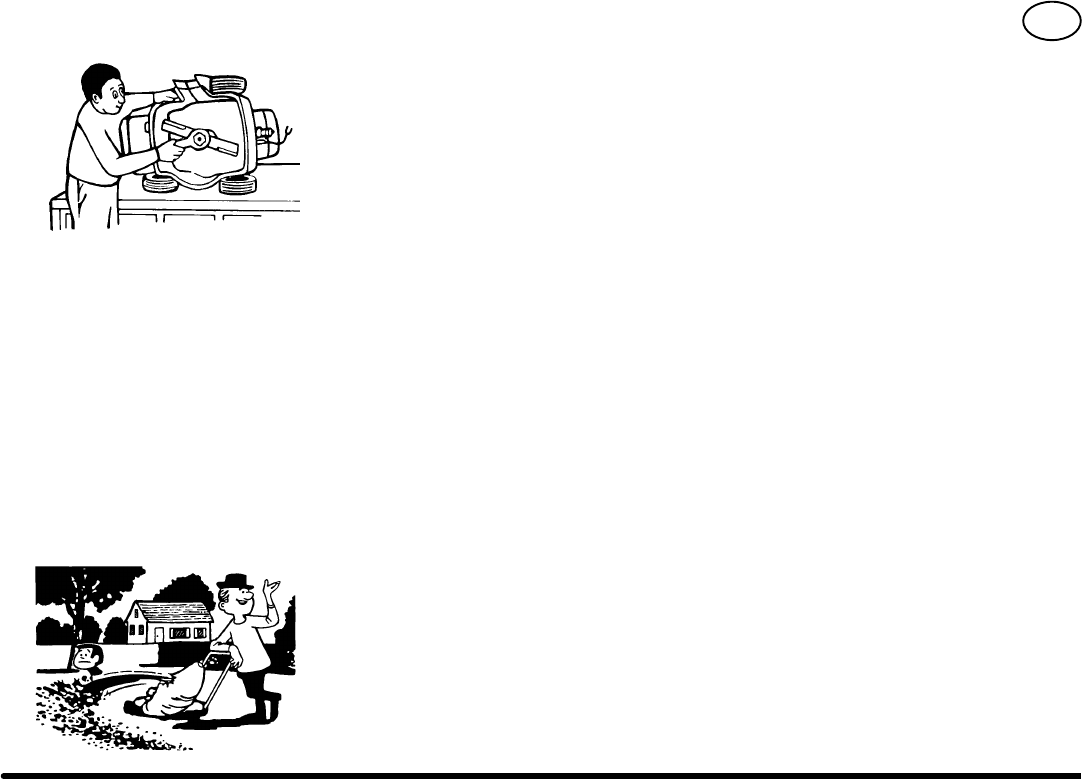
GB
9
F-030771L
the blade every two years.
A sharp blade decreases the workload on the
engine and more evenly cuts grass. Frequently
sharpen the blade for a better looking cut. Use
the left side of the mower housing to trim near
an object.
A grass bagger is a good accessory for your
mower. For best performance and safety, make
sure the grass bagger is approved for use with
your mower. Follow the assembly and operation
instructions included with the grass bagger.
Some grass baggers require a special blade for
best performance. Before you attach, check, or
empty the grass bagger, always stop the engine.
Before each use of the grass bagger, check for
cracks, wear or deterioration. Before you use the
grass bagger, replace a damaged part with a
replacement part approved by the factory.
For you to have a good green lawn, follow the
mowing procedures below. Do not cut the grass
too short. If you cut the grass too short you can
cause the grass to become yellow or make the
lawn look brown. Use a lower height of cut in
cool months when the grass is thicker. Raise the
height of cut in hot dry periods. If you cut the
grass with a blade that is not sharp or at a slow
engine speed you can damage the grass. Move
the throttle control to the FAST position when
mowing and using the grass bagger. Also, use a
slower ground speed when using the grass bag-
ger.
If you change the direction or pattern of cut
slightly every time you mow will make the grass
grow stronger and thicker. Do not add oil or gas-
oline to the mower while on the lawn. Spilled oil
or gasoline can kill the grass. In high or thick
grass, do not try to cut all the grass the first time.
Raise the height of cut on the first cutting and
lower the height for the next cutting. Another
way is to cut only part of the width of the mower
and decrease your ground speed (not the en-
gine) to move more slowly so that the mower
can discharge the grass as it moves forward.
Understand the controls and how they work.
Learn the ground speed(s) of your mower.
Check the stopping distance required at different
travel speeds. Check the turning radius of the
mower. The controls on your riding mower are
different from an automobile. The throttle is op-
erated by hand and holds the engine speed con-
stant until it is changed. The location of the
travel speed control is different from that of an
automobile. Also, the brake and clutch systems
are different. Remember the procedures to fol-
low in an emergency. Remember, turning off the
engine ignition switch will stop the blade and the
drive mechanism. If the traction of the wheels is
lost or does not feel safe, disengage all systems
and stop the engine. Dismount from the mower.
Push the unit to a safe place before you begin
mowing again.
Your unit has an electrical system that includes
an operator presence switch in the seat. The
operator presence switch detects if the operator
is sitting on the seat. The engine will stop if the
operator leaves the seat when the blade en-
gagement control is engaged. This operator
presence switch is a safety device only. It must
not regularly be used to stop the engine or the
blade. There are other control systems on the
mower for this purpose. Always keep the opera-
tor presence switch and other safety devices
and controls in place and operating for your pro-
tection.
Remember, your mower is a tool that can be
dangerous if it is not correctly used. Follow the
instructions in this Instruction Book. Safe and
careful use of the mower will give you many safe
hours of problem free use.
STEPS TO FOLLOW
Before Mowing
D Be sure to dress correctly. Wear hard shoes,
not sandals or tennis shoes.
D Examine the blade. A blade that is bent,
cracked, or damaged must be replaced with
a factory replacement blade.
D Fill the fuel tank outside. Clean off spilled
fuel.
D Read and follow the Owner’s Manual, the
instructions with the engine, and the instruc-
tions with any attachments. Owner’s Manual
instructions are for your safety and the safety
of others.
D Exhaust fumes are dangerous. Start the en-
gine outside.
D Make sure all safety devices are in place and
working correctly.
D Operation of the mower is only for a person
that has experience.
D Wet grass can be dangerous. Let the grass
dry.
D Instruct children and others to keep away
from the work area.
D Never cut the grass without good light.
D Pick up loose objects. Remove them from
the mowing area.
While Mowing
D Watch for fixed objects and avoid them. They
can damage the mower or cause injury.
D A hot engine, muffler and transmission will
cause a burn. Do not touch.
D Inclines and slopes must be carefully
mowed. See the “Guide” in the back of this
book to check a slope.
D Lack of daylight or good artificial light is
cause to stop mowing.
D Examine the mower, the blade, and other
parts for damage after hitting a foreign object
or if the unit vibrates excessively.
D Do not make adjustments or repairs without
stopping the engine (except for carburetor).
Disconnect the spark plug wire.
D On or near roads, watch out for traffic. Direct
discharge away from roads.
D When mowing, avoid areas where traction is
unsure. Before and while moving back-
wards, look behind and down for small chil-
dren.
D In heavy grass, raise the cutting height. Cut
slower. Stop the engine to remove clogged
grass from the mower.
D Never remove any safety related parts.
D Do not pour gasoline into a engine that is hot
or running.
After Mowing
D Always let the mower cool before storing in
an enclosed area.
D Foreign material on the mower is dangerous.
Clean off grass, leaves, grease and oil be-
fore storing.
D Tighten all loose nuts, bolts and screws be-
fore you use the unit.
D Empty and clean any grass catcher or other
accessory.
D Remove the key or disconnect the spark plug
wire to prevent unauthorized use.
D Make sure the mower is not kept near a
source of ignition. Gas fumes can cause an
explosion.
D Only original parts or factory approved sub-
stitutes can be used to service the mower.
D When storing the mower for an extended pe-
riod, remove the fuel from the fuel tank.
D Instruct children to leave the mower alone. It
is not a toy.
D Never keep gasoline near a source of igni-
tion. Always use an approved container.
Keep gasoline away from children.
D Lubricate according to the Instruction Book.
See “Lubrication”.
IMPORTANT--Read the Instruction
Book. Keep this book for future use and
reference.



